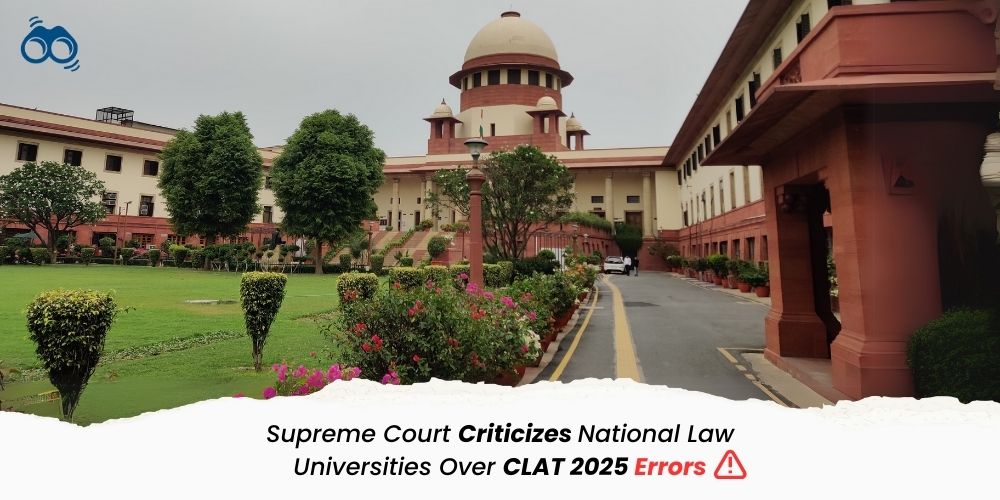Exam Integrity at Stake: SC Highlights Errors in CLAT-UG 2025 Question Paper
Supreme Court Urges Permanent Reform in CLAT Examination System
The Common Law Admission Test (CLAT-UG) 2025, a significant entrance examination for law aspirants in India, came under scrutiny due to concerns regarding errors in question framing. During a 7 May hearing, the Supreme Court criticised the National Law Universities (NLU) Consortium, stating that the exam papers had been prepared casually. With approximately 70,000 candidates affected, the court highlighted the serious consequences of such mistakes on students’ academic futures.
A bench led by Justice Bhushan R Gavai instructed the NLU Consortium to revise the marking scheme for six disputed questions, citing discrepancies that had influenced the merit list. Additionally, the court sought a response from the Centre regarding the possibility of establishing a permanent mechanism for conducting CLAT-UG, similar to the model used for the National Eligibility cum Entrance Test (NEET). The objective behind this suggestion was to enhance fairness and transparency in the administration of the exam.
The CLAT-UG 2025, conducted on 1 December 2024, served as an entry point for five-year LLB courses in 24 National Law Universities (NLUs) across India. The results were released on 7 December, following which multiple petitions were filed in various high courts, citing errors in the examination process. The Supreme Court observed that certain answer keys directly contradicted its previous rulings, while one question contained calculations unsuitable for an objective test designed to evaluate legal reasoning.
Expressing concern over the lack of seriousness in conducting CLAT, Justices Bhushan R Gavai and Augustine George Masih criticised the NLU Consortium for failing to uphold proper academic standards. The court was reviewing petitions that challenged the Delhi High Court’s 23 April ruling, which examined 17 disputed questions and recommended marking revisions for four, including the provision of grace marks for students who attempted three of the four contested questions, excluding Set A.
Senior advocates KK Venugopal and Gopal Sankaranarayanan, representing the petitioners, pointed out that concerns over CLAT’s exam errors were not new. They reminded the Supreme Court that similar issues had surfaced in 2013 and 2018, prompting the court to direct the Centre and the Bar Council of India (BCI) to take measures aimed at safeguarding students from such recurring challenges.
Questioning the absence of a standardised system, the bench urged the establishment of a permanent mechanism for conducting the exam. The judges enquired why the Union government had failed to act on past concerns and suggested that adopting a model akin to NEET or the Joint Entrance Examination (JEE) could minimise recurring errors and ensure greater accuracy and fairness in the selection process. The Supreme Court’s intervention underscores the urgent need for stricter oversight and accountability in CLAT’s administration, reinforcing the importance of a fair and transparent examination process for law aspirants in India.
Editor’s Note:
The recent issues with the CLAT-UG 2025 exam highlight ongoing challenges in India’s examination system, emphasising the urgent need for reform. Competitive exams are crucial for students' futures, making accuracy, transparency, and fairness essential. However, repeated errors in question setting, evaluation, and administration raise concerns, as mismanagement can lead to legal disputes, loss of trust, and stress for candidates. To improve entrance exam integrity and efficiency, a structured reform plan is needed. Standardised protocols should ensure accurate question setting and prevent contradictory answer keys. A central regulatory body, similar to NEET or JEE, could oversee exams like CLAT, reducing inconsistencies and ensuring fairness. Enhanced digital evaluation systems would minimise human error and improve transparency. Regular audits and formal grievance mechanisms should also be introduced to address student concerns promptly.
Skoobuzz firmly believes that India’s education system is at a crucial point where examination reforms are not only necessary but urgent. A well-organised approach can protect students’ interests, restore trust in competitive exams, and strengthen academic integrity across the country.














0 Comments (Please Login To Continue)